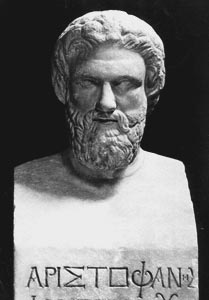„Regieren ist nichts für einen kultivierten oder ehrenhaften Mann.“
Die Ritter / Demosthenes
Original griech.: "ἡ δημαγωγία γὰρ οὐ πρὸς μουσικοῦ ἔτ᾽ἐστὶν ἀνδρὸς οὐδὲ χρηστοῦ τοὺς τρόπους."
